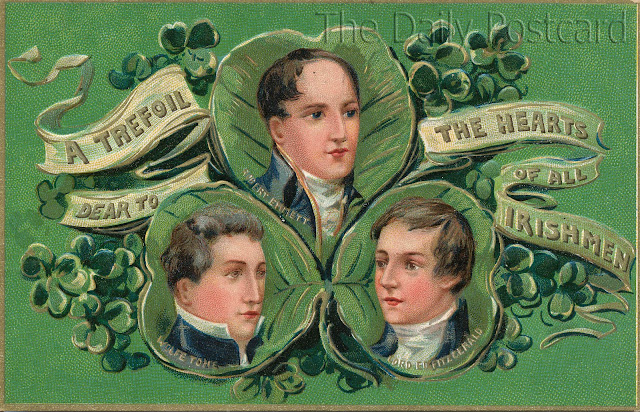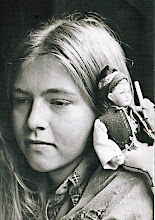I had the best intentions for a Veterans Day post focusing entirely on military and veterans, but I can't help what's written on the back of the card and where it leads. I certainly couldn't ignore the message sent to J.J. in Lucky Boy, Nevada. Actually, it seems very fitting, since today is not only Veterans Day, but also 11/11/11, a date some consider to be very lucky. It's also the 100th week of Sepia Saturday (more on that below.)
Here we have two pre-WWI American officers wearing Army and Navy military uniforms.
The first picture may be a likeness of Rear Admiral Caspar F. Goodrich.
And then there's the back of the first card. First of all, the message is written in French. Secondly, it's addressed to someone in Lucky Boy, Nevada, a place I had never heard of - and it was sent in 1911 from Goldfield, Nevada. One of the reasons I've never heard of Lucky Boy is that it's a ghost town. You can see current photos of it
here. There was a lot more action there in 1911 though, after silver was discovered in 1907. Gold and silver prospectors came from all over the country and from abroad to seek their fortune. Lucky Boy appears to have had a post office, since the card has a Lucky Boy cancellation.
I have trouble deciphering the message, but it was sent to J.J. Cousol from his mother (Julietta?), who reports that Mr. Murphy visited Doty and it was very nice. She also says that there's something in it for the son - something about Horn Silver. Horn Silver, as I just learned, is silver that is formed on the desert surface from weathering silver sulfide. You could come along with no experience and a shovel and easily haul away a fortune. But when the surface silver was gone, that was it. There wasn't more below.

J.J. Cousol's mother was writing from Goldfield, which by then was at the tail end of its Goldrush. At one point Goldfield had been the largest city in Nevada, all due to gold prospectors. Now it is also a ghost town, with many old buildings remaining. The famous brothers, Wyatt and Virgil Earp, came to Goldfield in 1904, and Virgil was hired to be the Goldfield Deputy Sheriff shortly thereafter. Poor Virgil died of pneumonia within six months of taking the position though. By 1911, when this card was sent, the population of Goldfield had declined to about 4,800. Now it has a population of about 440. You can see some great Goldfield photos past and present
here.
I can only guess that J.J.'s parents came to Nevada as part of the Goldrush and that when things started to get tough, J.J. ventured out and looked for better prospects in other parts of Nevada. And since we're talking about seeking fortunes, I should point out that the back of the postcard informs us that Senior Rear Admirals earn $8,800 a year when at sea and $8,000 a year when on shore.
Here's the back of the second card.
Apart from my other intentions, I had also in mind to post something separate to celebrate the 100th Sepia Saturday. After I wrote this post, I decided that it was really meant for Sepia Saturday, with a card that takes us back 100 years. Going back 100 years, we are suddenly in a time where people were prospecting for gold and silver, where World War I and World War II had not yet been imagined, and where communication from afar was primarily through the postal service.
For more ways to celebrate the auspicious 100th post, be sure to visit
Sepia Saturday.
Thanks to Alan and Kat for dreaming up the idea.



































































